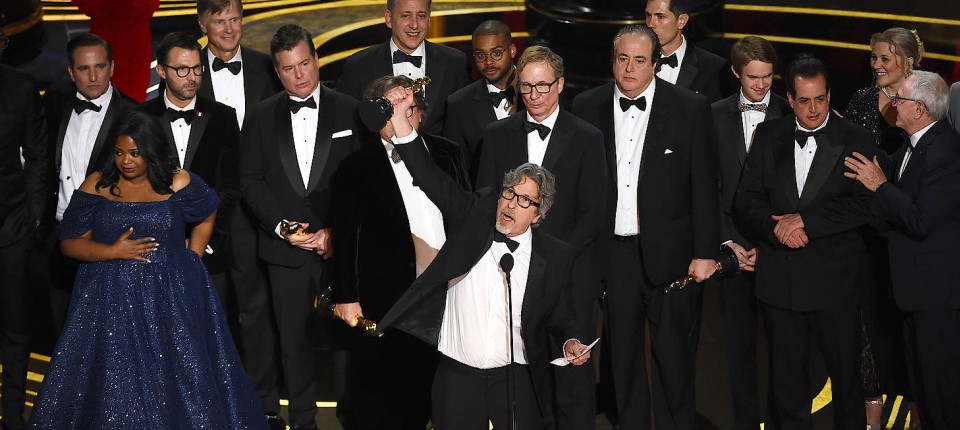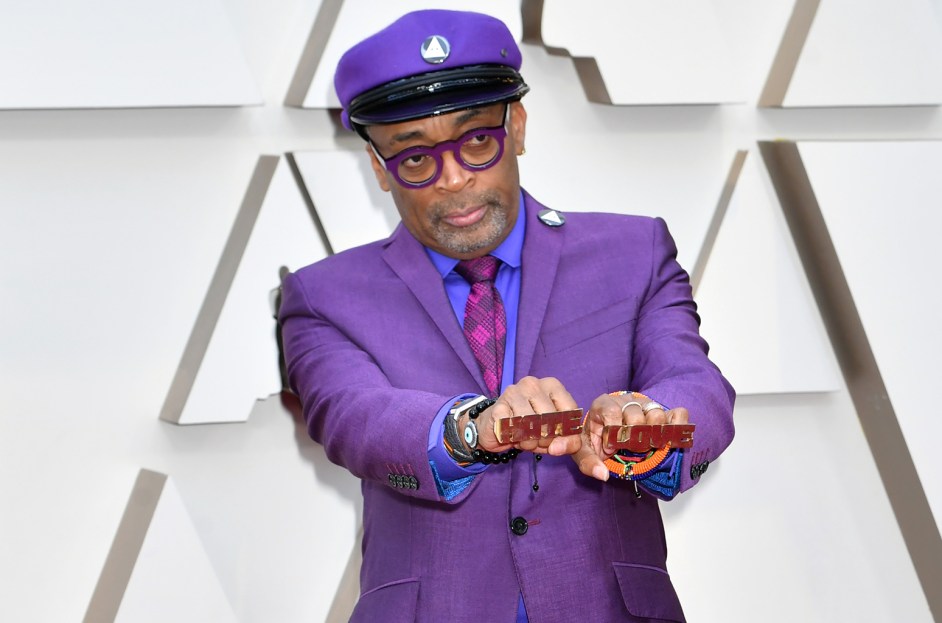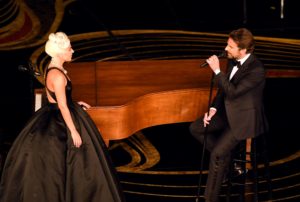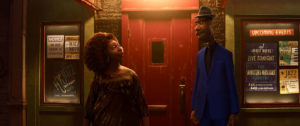Within the English-speaking world, there is a quirky expression for which it is difficult to find a suitable direct equivalent in Slovenian: "guilty pleasure". The phrase denotes an artistic product or a social event that a person enjoys, even though he or she hardly admits it, because he or she is aware of (and probably shares) the general negative reception of the same product or event. For the author of these lines, it is the Oscars. Even though the Academy of 7 000 or so members prove every year that it is all about self-aggrandizement and a 'kitchen', and this author spends most of the year repeating to himself like a mantra that there is no point in watching this circus anymore, he yields to it time and again.

It's conflict and it's compromise, and it's just ... it's new every time. (...) It's very, very exciting! And it's dying. (...) And the world says, "Let it die. It had its time."
This season, the Oscars were almost more interesting before the ceremony itself. In August 2018, the Academy decided to introduce a new category, popular film, which was soon revoked again after protests. In December 2018, comedian Kevin Hart was confirmed as the future moderator of the ceremony, a position he held for only a few days because he himself had resigned in the face of protests over past homophobic statements. A few days before the ceremony, the Academy devised a new method to the old problem of declining viewership and announced that some of the Oscars (photography, editing, make-up) would be presented during the commercials, which was again prevented by protests. Somewhere in between, Slovenia got its first female Academy member, Spela Čadež, who has made a name for herself internationally with her animated films Boles (2013) and Nighthawk (2016). There were, of course, no protests, but there could certainly have been more positive resonance and a broader presentation of her work in Slovenia.
This was the first time in three decades that this year’s ceremony at the Dolby Theatre in Los Angeles was held without an emcee. With a brief performance by Queen, fronted by Adam Lambert, the event began in medias res, with the very first award ceremony. Amy Poehler, Tina Fey and Maya Rudolph stretched out their speeches slightly, but stayed well under the length of the classic Oscar opening monologue. The event continued at a pace that was much faster than in previous years. Hollywood stars such as Helen Mirren, Jason Momoa, Melissa McCarthy, Brian Tyree Henry, Tyler Perry, Michael Keaton, Guillermo del Toro and Julia Roberts led the way through the competition categories, a wide range of public figures – from guitarist Tom Morello to Congressman John Lewis – introduced the Best Picture nominees, and somewhere in between, a good minute was spent on the technical, scientific and lifetime achievement awards, and a good two minutes on the announcement of the new Los Angeles Film Museum.
Consequently, the only longer segments were the tributes to the deceased filmmakers and the musical highlights with the nominated songs, the most artful of which was of course the favorite and subsequent winner Shallow, performed by the duo of Lady Gaga and Bradley Cooper from A Star is Born. This kind of condensed event thankfully spared us all the forced quasi witticisms of years gone by, from failed puns and excessive selfies to bringing fast food into the hall and mixing the so-called elite with the supposed little men.
Don't worry, they're fine. You can't crush a soul here. That's what life on Earth is for.

The competition categories were very different, and both the presenters and the winners proved that not everyone is cut out to perform on this kind of stage. Awkwafina and John Mulaney were probably the wrong choice for the Best Animated Short Film and Best Documentary Short Film awards. They did no service to a section of filmmaking that is the victim of ignorance both within the Academy and more widely with their inane comments about the importance of the category. At the other end of the spectrum, some of the winners have completely lost their sense of time and content, despite the aids.
Thus, perhaps the best acceptance speech was given by the winner of the Best Costume Design award, Ruth Carter, who immediately placed the Oscar in the context of her long career, pointing out how Black Panther embodied African nobility and showed how women can take the reins on screen. Political statements and commentaries on social developments were rather scarce this year. Keegan-Michael Key took issue with Trump’s incompetence in closing umbrellas, Rami Malek highlighted his family’s migration from Egypt, Alfonso Cuarón recalled the precarious state of the Mexican workforce in the US, and Spike Lee reflected on the history of African-Americans and next year’s presidential elections.
They say you're born to do something, but how do you figure out what that thing is? And what if you pick up the wrong thing. Or somebody else's thing, you know? Then you're stuck!
Among the prizes, which were in general well distributed among all the favorites, the two biggest losers were two veterans. Glenn Close failed to turn also her seventh nomination in 36 years into a win and will probably be among the winners of the (consolation?) Lifetime Achievement Award in the coming years. Perhaps along with Paul Schrader, screenwriter of Taxi Driver (1978) and Raging Bull (1980), among others, who surprisingly only this year sneaked up on an Oscar nomination.
The champions of the evening are the winners of the acting categories, who in recent years have also or mainly made their mark in series and sealed their move to the big screen with an Oscar. Mahershala Ali, who we remember from House of Cards (2013-2018), succeeded for the second time with Green Book, after Moonlight (2016). The rest have had (euphoric) premieres. Regina King (The Big Bang Theory, 2007-) for If Beale Street Could Talk and Rami Malek (Mr. Robot, 2015-) for Bohemian Rhapsody, as well as Olivia Colman (Broadchurch, 2013-2017) for The Favourite.
But the first among equals are, of course, two victors. Alfonso Cuarón, who started the Mexican wave in Hollywood, managed to win Oscars in (conditionally speaking) four categories during one decade and with two films (this year’s Roma and 2014’s Gravity).[1]: directing, editing, cinematography and foreign language film. Peter Farrelly’s Green Book is certainly an even bigger story.
If in 2016 we were puzzled when Adam McKay, director of relatively shallow comedies starring Will Ferrell, won the Oscar for The Big Short, now we are witnessing the celebration of the director who, together with his brother Bobby Farrelly, was for many years considered the king of toilet humor. The man who made fun of chronic diarrhea (Dumb And Dumber, 1994) and cum in hair (There’s Something About Mary, 1998) and made a fool of obesity (Shallow Hal, 2001), Siamese twins (Stuck On You, 2003), multiple personalities (Me, Irene And I, 2000) and related themes, is now a double Oscar winner and co-writer of the (admittedly clearly compromise) Best Picture Oscar. Apparently, anything is possible.
Jazz injects heart and soul into our blood, strengthens and ignites fireworks in our brain.
There were few real surprises. Perhaps the most notable were The Favourite’s defeat to Black Panther in costume design and production design, Bohemian Rhapsody’s surprising win in editing (compare that to Vice…) and the almost shocking victory of the visually most restrained First Man in the visual effects category, in competition with Solo: A Star Wars Story, Ready Player One, Avengers: Infinity War and Christopher Robin.
When this year’s Oscars ended about an hour earlier than usual, all the above left us with a strange aftertaste. Is an event that just dribbles out agenda items, without too many positive or negative highlights, extremely bland and boring, or the best possible and exactly the kind of event we need?
First published in Slovenian in Koridor, 3/2019



